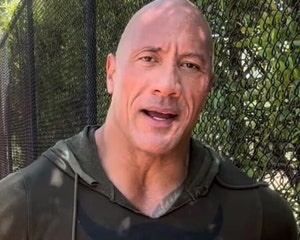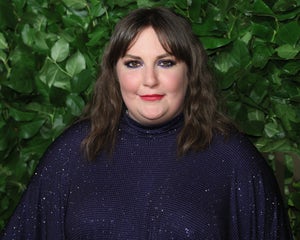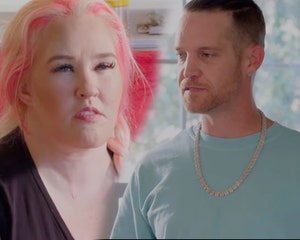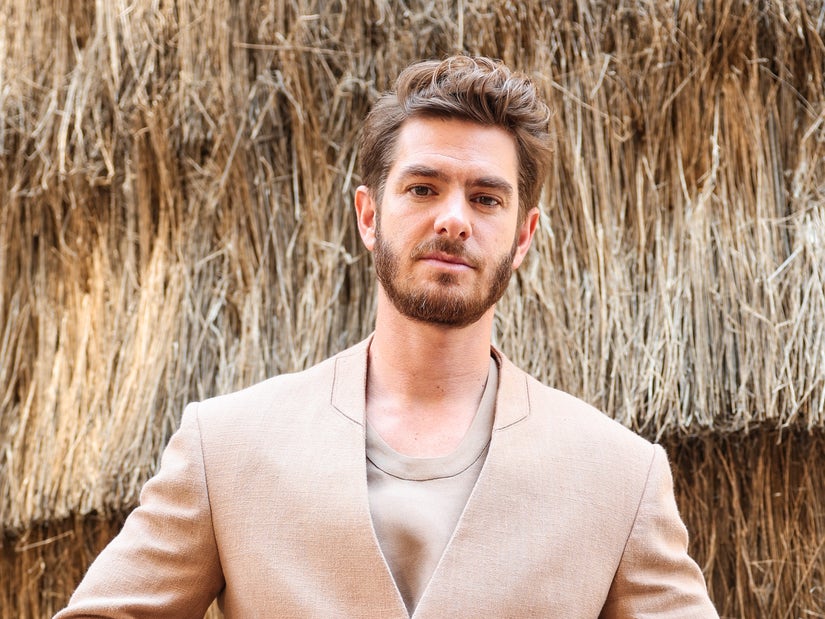Robert Downey Jr. on What Prison Was Like, Addiction, Reconciling His Father with 'Sr.'
Robert Downey Jr. used his documentary "Sr." as a form of therapy and a way to understand his relationship with his filmmaker father, and how it impacted his struggles with addiction — plus, Dax Shepard asks what it was like in prison.
Robert Downey, Jr. has lived enough life for multiple lifetimes. He revealed a lesser-seen chapter of his storied adventures through this world with his compelling documentary about his father, Robert Downey “Sr.”
RDJ admitted in a frank conversation with Dax Shepard and Monica Padman on their “Armchair Expert” podcast that the project took on a bit of a life of its own, even pulling him in front of the camera and into its narrative.
Robert Downey Jr. Given Drugs at Age 6 by Father
One one level, the film is Sr. filming an avant-garde documentary about his own life. But it also carries another layer. As his health declines, it’s also a son attempting to reckon his complex relationship with his father and preparing to say goodbye.
Goodbye Is a Privilege
For Dax, it was a palpable experience as he was able to relate directly to losing one’s father. He share that the scene of RDJ lying in the bed with his father at the end was particularly impactful as he remembers that experience almost exactly from his father’s own death.
After a brief three-month battle with cancer, Dax’s father succumbed to the disease in December 2012. “So much of it reminded me of that experience,” he told RDJ of the film, expressing how much “gratitude” he has that he was there at the end.
“I can’t believe i was there and I did it right,” he shared. “I have done so many things wrong and there’s so many moments in my life I couldn’t have been there, but just to get to do that is an enormous gift.”
Agreeing “one hundred percent” in how impactful that moment was for him, RDJ said that with the perspective of distance from such an emotionally intimate project, he’s come to understand that he went into it “kind of as a defense mechanism and an avoidance technique.”
I got to do it with a generation of Downeys that are untouched by the ugliness of addiction
It was during the process of making the film and seeing his father’s health begin to decline more rapidly that RDJ and his fellow filmmakers, as well as his wife Susan, realized what this film was really about.
RDJ said that his wife told him, “You have to think of this in a structure and you have to start thinking about your closure with your dad, whether its monitored or not, otherwise, forget it. It won’t make sense to anyone who ever watches it. It won’t make sense to you.”
He found that connection when his son wanted to join him for that last trip to New York to see his father. “I got to do it with a generation of Downeys that are untouched by the ugliness of addiction,” he shared. “And so, its almost like I needed to be filmed, monitored, and graded doing it in order to do it.”
One of the moments that helped him with his grief after filming the project was an unexpected juxtaposition with his father’s own journey as a filmmaker. He shared that his father could only speak “through the language of film,” which is evident throughout the project, so it’s appropriate this was where he found a moment of connection.
Dwayne Johnson Urges Fans to 'Reconcile' with Fathers After Failing to Do So Before Own Dad's Death
He recalled being at one of his father’s film screenings at the Castro Theater in San Francisco, and suddenly he was at the same place. “I’m watching a screening of ‘Sr.’ from the back looking at it from the screen with these set pieces back there, and I had one of those definitive quantum moments,” he said.
“Sometimes you have these on set, sometimes you have them in life where you have them at transitions of life where you just go, ‘Just stand here, if you can understand this,'” he added. “Because this is actually what life is if you’re lucky. You get to actually stand there for a second and see this thing, and you hold space and time and grief.”
Dax said that watching RDJ try to understand his father in the film really connected with him, as did a line from Sr. when he admitted he didn’t understand himself, either. “I have no clue who I am and I’m not going to try to know,” he said.
“If I had to sum what he might have said – this is what made me cry – I think his point of view was, ‘Life is a hundred year-long joke,'” Dax said. “And then in the scene I realized, ‘No, it’s a f—ing tragedy. Life is a f—ing tragedy … And you try to laugh your way through it, you try to joke because it is a tragedy, but it catches up with us all the time. The joke turns on us a lot.”
Robert Downey Jr. Talks Addiction Issues, Sheds Light on Son Indio's Substance Abuse
Roots of Addiction
From there, Dax pivoted to addiction, which is something he and RDJ have in common, comparing this idea of a perceived “joke” actually turning out to be a “tragedy.”
“[When] you discovered drugs, you were like, ‘Yes, what a joke, this is hilarious. Now I feel like a cartoon character. Now I’m really getting one over on the universe. I’m having a blast in this technicolor, kaleidoscopic dream of mine.’ And then it catches up with you because again, it’s a f—ing tragedy.”
As recovering addicts, Dax felt that he and RDJ are both dealing with their addictive tendencies in similar ways now that they’re recovering addicts. RDJ asked co-host Monica Padman which if them was “more neurotic” in how they’re living their day-to-day lives now.
She joked that she’d have to say RDJ because she doesn’t know him as well and Dax would be mad at her, but Dax agreed with her.
Lena Dunham Celebrates Five Years of Sobriety: 'Happiest of My Time on Earth'
“I don’t know how we would evaluate it, but let’s say that there’s a spectrum, 0-10, for addiction,” he said. “And I got it pretty bad; I think I’m probably an 8. But I’ll give you this credit, I think you’re a 10. I think you’re the most ‘addict-y’ motherf—er I have ever met in my life!”
He then told Monica about RDJ obsessively chewing gum, “just pulling them out and putting them in his mouth and putting more in.”
Meanwhile, Dax was talking about addiction as if it was a chemical issue while Monica — based on what she saw in “Sr.” — was thinking that for RDJ, “his addiction is more based in life or his youth.”
“Sr.” was revealed to also be an addict. Nevertheless, the documentary vividly details his father’s struggles with addiction and even how he introduced his very young son to them. One anecdote that both men confirmed is that RDS gave RDJ a joint when he was six years old.
I think you’re the most ‘addict-y’ motherf—er I have ever met in my life
RDJ shut down any confusion about the roots of his addiction on the podcast, saying definitely, “She’s right, so let’s just go off that basis.” He agrees that for him it was definitely more about his upbringing and environment than anything else.
He also agreed that while their addiction is still a part of them, there’s another thing that helps him find perspective, and that comes from outside himself and whatever soothing techniques — like gum — he might be employing.
“What I also like is look around at the people charged with the ”til death do us part’ with you; wife, kids, closest associates,” he said. “If they’re at peace with how were clucking along, no matter how much coal we are shoving into our weird little engine, you go, ‘Okay.'”
“I always look for, when are the people closest to me seeming out of balance because of my lack of integrity,” he continued. “That’s when I know, alright, I gotta shift something here. We’re all just weird animals. It’s fun.”
Why Kristen Bell and Dax Shepard Are Open with Their Kids About Addiction, Sex
Accepting Prison as Reality
Everyone knows that RDJ’s struggles with addiction — and failure to appear for multiple court-ordered drug tests — culminated in a three-year prison sentence, of which he served one year. Dax, though, had never asked him about that experience.
As an addict himself, he explained that he well understands the power of that “denial muscle” that addicts lean on. “This isn’t going to happen,” he said. “Those aren’t police lights behind me. They’re not going to give me the breathalyzer. I’m not carrying anything.”
And so he wondered, how long after an addict finds themselves actually behind bars and paying consequences for their actions before the denial wears off and the reality of the situation sets in.
In response, RDJ said he’d offer up the “flashcards” of his experience with incarceration. It was clear that in the beginning, reality wasn’t a part of RDJ’s story. “I’m in court and I’m being over-sentenced by an angry judge,” he recalled, “and at some point he said something in Latin and I thought he was casting a spell on me.”
Liam Payne Reveals He's More Than 100 Days Sober: 'Super Happy'
He then detailed the “receiving center” he spent some time in before it was ultimately decided where he would go. For RDJ, it was the California Substance Abuse Treatment Facility and State Prison in Corcoran.
But before then, he was lumped in with everyone. “Arguably the most dangerous place I’ve ever been in my life because nobody is designated if they’re a level 1, 2, 3, or 4 criminal,” he explained. He compared it to a “really bad neighborhood.”
“There was no opportunity there; it was only threats: yes, everyone is going to take your wallet so watch it,” he explained. “I remember walking out at one point when I popped out of my cell to go to the shower, and I didn’t know it but I was a little spun out and I had my underwear on backwards that put the entry in the back. I remember eliciting some strong chuckles and jeers from my fellow inmates.”
Once he got transferred to where he would serve out the rest of his sentence, though, it was time to do some mental reconciling. For him, he said one impactful moment was “walking onto the yard that you’re going to be doing more than a year on for the first time.”The closest thing I can associate it to is to being sent to a distant planet where there’s no way home until the planets align.”
The most important thing is, as long as you have the willingness to do harm, it is unlikely you will be targeted
Ultimately, though, aside from that jarring first experience, he said that the transition period is just around two weeks. He said that as people, “we are programmed to, within a short amount of time, to be able to adjust to things that are seemingly impossible.” He also knew that he could have been in a far more dire situation.
He said those first two weeks were the transition for him. “Day 15 was a ball,” he said. “By Day 15, I’m dialed in.” And from there, it was learning how to get by on a day-to-day basis, which did include a mentality that doesn’t exist for most on the outside.
“The most important thing is, as long as you have the willingness to do harm, it is unlikely you will be targeted,” he explained. “It really is that thing of, what is the difference between acting like your willing to do harm and actually being willing to do harm.”
Mama June Called Out by Husband For Lying To Herself About Strained Relationship With Daughters (Exclusive)
“I remember the extreme example, and whoever said this is an idiot, they go, ‘Always have a plan to kill whoever you meet,’ which is probably one of those safety experts who was like a black ops guy,” he continued. “Just f—ing shut up.”
When Dax asked him how he made friends on the inside, RDJ told him, “motherf—er, you don’t have friends in the joint. You have acquaintances.”
“Okay, how did you pick your acquaintances?”
“Just to wrap this up, there’s a handball court. Depending on what the politics were and depending on whether your pigmentation had access to that court,” he said. “And like anything – did you ever see ‘Midnight Express’? – it’s kind of like you can say, ‘How long did it take him to get used to a Turkish prison?’ Two weeks.”
Source: Read Full Article







